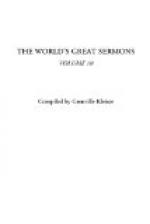Let the exile say unto himself: “Your warfare is accomplished; your iniquity is pardoned; the Lord’s hand will give unto thee double for all thy sins that are forgiven.” The great faiths and convictions of the prophets and law-givers, your language and your laws and your liberties, have not been destroyed by captivity; rather slavery has saved them. At last you know their value; in contrast with the idolatry of the Euphrates, the jargon of tongues, the inequality of rights, the organization of justice and oppression, how wonderful the equity of the laws of Moses! How beautiful the faith of the fathers! How surely founded the laws of God. Henceforth idolatry, injustice and sin became as monstrous in their ugliness as they were wicked in their essence. Everything else might go, but not the faith of the fathers. Persecution was like fire on the vase; it burned the colors in. Little wonder that the tradition tells us that for the next hundred years, at stated periods, all the people in the land came together, while a reader repeated this chapter on the unwearied God and the fainting strength of man that had recovered unto hope, men whose hopes had been baffled and beaten.
The thought of an unwearied God is also the true antidote to despondency. The ground of optimism is in God. When that great thinker described certain people as without God and without hope, there was sure logic in his phrase, for the Godless man is always the hopeless man. Between no God anywhere and the one God who is everywhere, there is no middle ground. Either we are children, buffeted about by fate and circumstances, with events tossing souls about in an eternal game of battledore and shuttlecock, or else the world is our Father’s house, and God standeth within the shadow, keeping watch above His own. For the man who believes in God, who allies himself to nature, who makes the universe his partner, there is no defeat, and no death, and no interruption of his prosperity. Concede that there is a God, and it follows as a logical necessity that He will not permit any enemy to ruin your life and His plans. For a man who holds this faith it follows that there can be no defeat, or failure. Indeed, the essential difference between men is the difference in their relation toward God. Here are the biographies of two great men. Both are men of genius, both are marvelously equipped, but their end was, oh, how different. One is Martin Luther, who stood forth alone, affirming his religious freedom, in the face of enemies and devils thick as the tiles on the roofs of the houses. The few friends Luther had shut him up in a fortress to save his life, but Luther mightily believed in God. With the full consent of his marvelous gifts, he surrendered his life to the will of God. Knowing that his days were as brief as the withering grass, he allied himself with the Eternal. In his discouragement he read these words, “The Everlasting God fainteth not, neither is weary.” In that hour Martin Luther shouted for joy. The beetling walls of the fortress were as tho they were not. Victorious he went forth, in thought, ranging throughout all Germany. And going out, he went up and down the land telling the people that God would protect him, and soon Germany was free.




